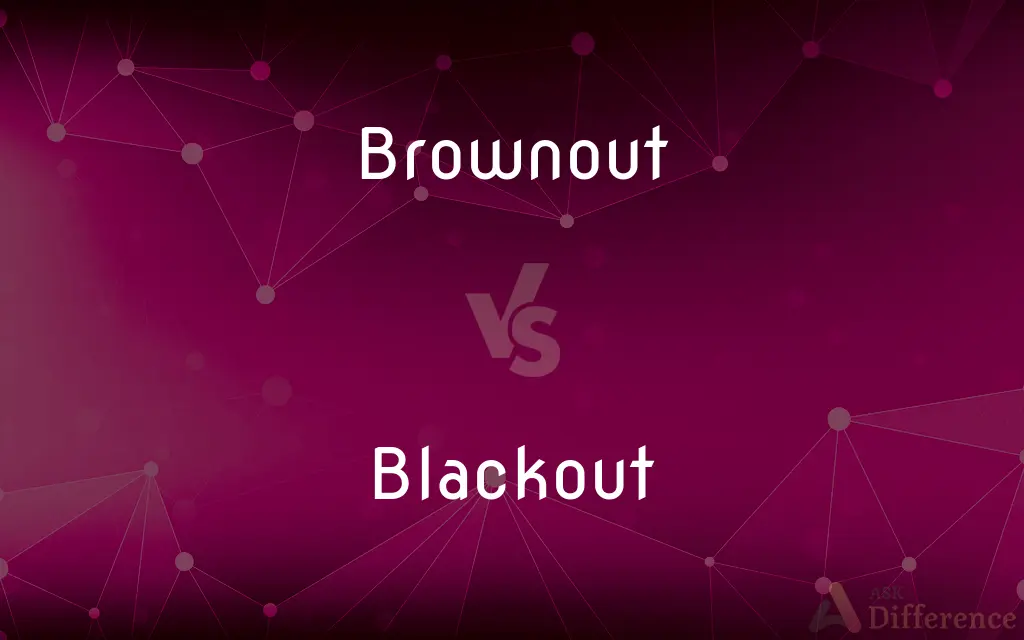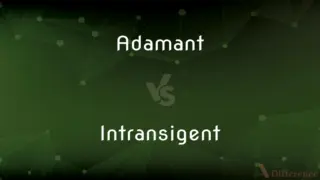Brownout vs. Blackout — What's the Difference?
Edited by Tayyaba Rehman — By Maham Liaqat — Updated on April 25, 2024
A brownout is a reduction in or restriction on the availability of electrical power, typically temporary and partial, whereas a blackout refers to a complete loss of power over a certain area.

Difference Between Brownout and Blackout
Table of Contents
ADVERTISEMENT
Key Differences
A brownout involves a decrease in voltage in an electrical power supply, often intentionally implemented to avoid a total power failure. Whereas a blackout is a total interruption of power supply, often unexpectedly due to system failures or external factors like severe weather.
During a brownout, lights may dim and electrical devices might underperform, affecting their functionality but not completely halting their operation. On the other hand, during a blackout, all electric power is cut off, causing all electrical devices and lighting to cease functioning.
Brownouts can be a controlled response by power companies to reduce load on the electrical grid and prevent a full-scale blackout. In contrast, blackouts are generally uncontrolled and occur when the power grid is overwhelmed or damaged.
While brownouts are often used strategically to manage energy demand during peak usage times or emergencies, blackouts occur without warning and result in more widespread disruption and emergency situations.
Residents may receive advance notice about planned brownouts, allowing for preparation; however, blackouts typically happen without notice, necessitating emergency preparedness and immediate response to ensure safety.
ADVERTISEMENT
Comparison Chart
Definition
Partial, temporary reduction in power supply.
Complete, often unexpected loss of power.
Impact
Devices underperform, lights dim.
All electric devices stop, lights go out.
Control
Often planned or controlled.
Usually unexpected and uncontrolled.
Purpose
To prevent overloading and blackout.
Result of overload or system failure.
Notice
Sometimes announced in advance.
Rarely predicted, occurs suddenly.
Compare with Definitions
Brownout
A temporary reduction in voltage in an electrical power supply.
During the brownout, our computers ran slower than usual.
Blackout
Result of power grid failures or external disruptions.
The accident at the power station triggered a widespread blackout.
Brownout
A drop in electrical power that does not result in a total power loss.
The brownout caused the lights to flicker and dim but didn’t turn off completely.
Blackout
Emergency condition requiring immediate restoration efforts.
Emergency teams worked overnight to restore electricity after the blackout.
Brownout
Intentional power voltage reduction to avoid overloading the system.
The utility company scheduled a brownout during the heatwave to conserve energy.
Blackout
A complete interruption of electrical power.
The city experienced a blackout after the storm knocked down power lines.
Brownout
A preventive measure to stabilize the power system.
The brownout was implemented to prevent a more severe blackout.
Blackout
Unexpected and total loss of power supply.
The blackout lasted for hours, leaving us in complete darkness.
Brownout
Managed power reduction affecting certain areas to maintain grid stability.
Brownouts are more frequent during summer when electricity demand spikes.
Blackout
Severe form of power outage affecting large regions.
The blackout affected several states and required days to fully resolve.
Brownout
A reduction in or restriction on the availability of electrical power in a particular area
The cities are experiencing brownouts as air conditioners are switched into overdrive
Blackout
A period when all lights must be turned out or covered to prevent them being seen by the enemy during an air raid
She peered out through the blackout curtains
People found it difficult to travel in the blackout
Brownout
A reduction or cutback in electric power, especially as a result of a shortage, a mechanical failure, or overuse by consumers.
Blackout
A temporary loss of consciousness
She was suffering from blackouts
Brownout
A period of low alternating current line voltage, causing a reduction in illumination
When demand for electricity exceeds the available supply, a brownout occurs.
Blackout
A cutoff of electric power, especially as a result of a shortage, a mechanical failure, or overuse by consumers.
Brownout
Temporary dimming of vision, usually with a brown hue and accompanied by loss of peripheral vision or tunnel vision.
On rising suddenly from her chair she experienced a brownout and had to sit down again quickly.
Blackout
The concealment or extinguishment of lights that might be visible to enemy aircraft during an air raid.
Brownout
Temporary closing of a fire station, usually due to budget restrictions.
Fire departments across the country have been forced to rely on rolling brownouts because of the recession.
Blackout
The sudden extinguishment of all stage lights in a theater to indicate the passage of time or to mark the end of an act or scene.
Brownout
A power outage during the day; distinguished from a blackout, which occurs at night
Blackout
A short, comic vaudeville skit that ends with lights off.
Brownout
A blackout, regardless of time of day.
Blackout
A temporary loss of memory or consciousness.
Brownout
Darkness resulting from the extinction of lights (as in a city invisible to enemy aircraft).
Blackout
A suppression, as of news, by censorship.
Brownout
A partial reduction in the amount of electric power available to customers in a region, such as by reduction of voltage or selective cutoff of certain customers; - it occurs for example in summer when the demand for electricity for air-conditioning exceeds the supply, or when power to certain customers is cut off by a severe storm. It is contrasted with blackout, which is the total loss of electrical power in a region.
Blackout
A suppression of the broadcast of an event or program, as to support ticket sales at a local venue.
Brownout
Darkness resulting from the extinction of lights (as in a city invisible to enemy aircraft)
Blackout
A suspension of a discounted price or free offer, as for an airline ticket or a lift ticket at a ski resort.
Blackout
A temporary loss of consciousness.
Blackout
A temporary loss of memory.
Blackout
An instance of censorship, especially a temporary one.
Media blackout
The 2012 English Wikipedia blackout
Blackout
A large-scale power failure, and resulting loss of electricity to consumers.
Blackout
(historical) The mandatory blocking of all light emanating from buildings, as well as outdoor and street lighting as a measure against aerial bombing or naval attack, as imposed during, e.g., World War II.
Blackout
(attributive) The blocking out of as much light as possible.
Blackout blinds; blackout curtains
Blackout
(nonstandard) black out
Blackout
A suspension of radio or tv broadcasting.
Blackout
Any darkness resulting from the extinction of lights.
Blackout
The failure of electric power for a general region sufficient to extinguish all normal lighting.
Blackout
A momentary loss of consciousness.
Blackout
Partial or total loss of memory.
Blackout
A period during which artificial lighting is forbidden, as in a city as a precaution against an air raid.
Blackout
The darkening of all stage lights, as at then end of a performance or between acts.
Blackout
Suppression of information distribution; as, there was a blackout on news from the military for the first day of the Gulf War.
Blackout
The prohibition of the broadcasting of a sports event, such as a boxing match or football game, sometimes confined to one particular area. It is usually done to encourage sales of tickets to the event.
Blackout
A suspension of radio or tv broadcasting
Blackout
Darkness resulting from the extinction of lights (as in a city invisible to enemy aircraft)
Blackout
The failure of electric power for a general region
Blackout
A momentary loss of consciousness
Blackout
Partial or total loss of memory;
He has a total blackout for events of the evening
Common Curiosities
What causes a brownout?
Brownouts are caused by intentional reductions in voltage by power companies to avoid overloading the system.
How long do blackouts usually last?
The duration of blackouts can vary widely, from a few hours to several days, depending on the cause and the area affected.
What are the typical consequences of a blackout?
Consequences include loss of lighting, ceased operation of electrical appliances, potential safety hazards, and economic disruptions.
Are brownouts safer than blackouts?
While brownouts are generally less severe because they do not involve a complete power loss, they can still pose risks to electrical devices and systems.
How can one prepare for a blackout?
Preparation can include having backup power sources, maintaining a supply of non-perishable food and water, and ensuring flashlights and batteries are available.
What emergency services are typically affected by blackouts?
Blackouts can impact emergency services by disrupting communications, lighting, and operations of medical and security equipment.
Can a brownout damage electrical appliances?
Yes, brownouts can cause damage to sensitive electrical devices due to low voltage levels, potentially affecting their performance.
What preventive measures can reduce the risk of blackouts?
Preventive measures include upgrading infrastructure, implementing grid modernization, and encouraging energy conservation practices among consumers.
Are there any benefits to experiencing brownouts?
While inconvenient, brownouts can help prevent the much more severe consequences of an uncontrolled blackout by managing grid stability.
How do utility companies handle frequent brownouts?
Utility companies may invest in grid improvements, increase generation capacity, or adjust power distribution strategies to handle peak loads more effectively.
Share Your Discovery

Previous Comparison
Mathew vs. Matthew
Next Comparison
Adamant vs. IntransigentAuthor Spotlight
Written by
Maham LiaqatEdited by
Tayyaba RehmanTayyaba Rehman is a distinguished writer, currently serving as a primary contributor to askdifference.com. As a researcher in semantics and etymology, Tayyaba's passion for the complexity of languages and their distinctions has found a perfect home on the platform. Tayyaba delves into the intricacies of language, distinguishing between commonly confused words and phrases, thereby providing clarity for readers worldwide.
















































